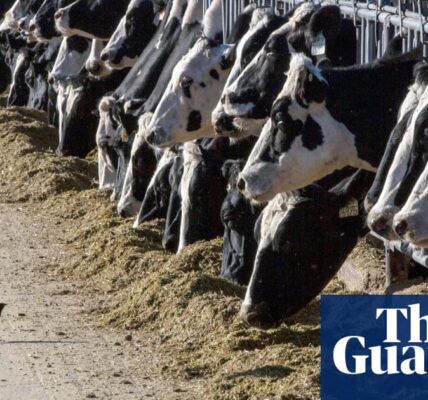The things that you’re liable to read in the IPCC bible ain’t necessarily so, Chris Uhlmann says. It’s a bold claim | Temperature Check
You know you’re in for a bit of grandiose lecturing on climate change when conservative commentators start making comparisons to religion and throwing around quotes from the 20th-century science philosopher Karl Popper.
Now I’ve got nothing against Popper, but you need to be on pretty solid ground to declare, as the Sky News contributor Chris Uhlmann did last weekend, that the idea global warming is causing more extreme weather is “an article of faith” rather than something we can just test and observe.
In an article in The Australian, Uhlmann, the former political editor at the ABC and Nine News, picked his way through Popper before cherry-picking his way through major climate reports to make his case.
“The zealots who invoke The Science as a gag order have never read the research or wilfully ignore its infuriating uncertainty,” wrote a confident Uhlmann.
“Take the deeply entrenched belief that global warming is causing more extreme weather. This is so ubiquitous as to be unquestioned.”
Uhlmann points to the Intergovernmental Panel on Climate Change’s (IPCC’s) 2021 report The Physical Science Basis as evidence that there’s little sign of climate change having much to do with cyclones, droughts or bushfires.
This is a global warming “bible”, Uhlmann writes (actually, some scientists have complained for a long time that the IPCC has been too conservative in its reports).
When Uhlmann asks “what of bushfires?” he quotes the 2021 IPCC report, which says the “extreme conditions, like the 2019 Australian bushfires and African flooding, have been associated with strong positive (Indian Ocean Dipole) conditions”.
But he does not point to a different part of the same report that says: “Observations show a long-term trend towards more dangerous weather conditions for bushfires in many regions of Australia, which is attributable (at least in part) to anthropogenic climate change.”
Prof Jason Sharples, director of the bushfire research group at UNSW Canberra, says in his opinion Uhlmann’s attempt to explain changing fire conditions is “an extremely superficial and misleading representation”.
“The Indian Ocean Dipole is a mode of climate variability,” he says.
“Changes in fire risk are driven by climate variability superimposed on the general warming trend. The general warming trend means we are more likely to experience warmer temperatures, which means we can expect lower fuel moisture content. Lower fuel moisture content means more intense bushfires that are more likely to be driven by spotting and produce violent pyroconvective events.”
A “pyroconvective event” is when a fire becomes so ferocious that it connects to the atmosphere above and generates its own violent weather, creating plumes as high as 15km, with unpredictable wind gusts. They are feared by even the most experienced firefighters.
In a register of pyroconvective fires in Australia going back to 1979, only six occurred before 2000 and 63 before 2019. But the Black Summer fires of 2019-20 produced 45 on their own, Sharples says.

Fewer cyclones, more rain
Perhaps Uhlmann should have also looked at the 2022 report from the IPCC that covers “Impacts, Adaptation and Vulnerability”. That’s a pretty big clue in the title.
There’s a whole chapter on Australasia. To extend the analogy, this would be like flicking through the book of Genesis and then declaring you’ve read the whole Bible.
The chapter says changes in the climate are exacerbating many extreme events in Australia.
Those trends, the report says, include more hot days, more heatwaves, rising sea levels and more extreme fire weather in the south and east. All those trends are likely to worsen as more greenhouse gases are added to the atmosphere.
Remember that, according to Uhlmann, this is apparently the climate change bible. Are the zealots only supposed to pick the parts they like? That would be very anti-Popper.
Uhlmann says it is “not true” that climate change was making cyclones more destructive, or that the December 2023 ex-Tropical Cyclone Jasper should be seen as a sign of things to come. The cyclone dumped several metres of rain in some areas.
To make his point, Uhlmann points to the bible (sorry, the IPCC), which says the number of cyclones forming in the Australian region is going down. “Pause on that,” he writes.
Except, this is hardly a revelation. Prof Andrew Dowdy, a University of Melbourne expert on Australian climate trends, says that for at least a decade climate models, and reports of those models, have been suggesting the number of cyclones might go down.
But those same projections, Dowdy says, also suggest a greater proportion of cyclones that do form will shift to the more intense categories as the planet warms. And rainfall?
Dowdy says: “While noting uncertainties around attribution of a single event like TC Jasper to climate change, the current scientific understanding is that climate change is loading the dice towards a higher chance of extreme rain from tropical cyclones.”
A recent review of rainfall intensity in Australia, co-authored by Dowdy, found that “although fewer [tropical cyclones] are likely in a warmer world in general, this is more likely for non-severe TCs than severe TCs, with extreme rainfall from TCs likely to increase in intensity”.
That same review found climate change was causing an increase of between 8% and 15% in rainfall intensity per degree of global warming.
All the warming
Uhlmann does at least concede the IPCC report shows the climate is changing and the world and Australia is getting warmer, “and that industrial activity has played a part in forcing some of it”.
Some of it? More like all of it.
According to a part of the IPCC’s summary report not mentioned by Uhlmann, between the pre-industrial period and 2010 to 2019, the planet warmed between 0.8C and 1.3C. Natural changes barely contribute.
Greenhouse gases caused between 1C and 2C of that warming. Aerosol pollution had a cooling influence, which is why it’s possible that greenhouse gas warming could be higher than the observed warming.
So it’s more likely “all of it” and then some. But that’s just what the bible says.
Source: theguardian.com

